Ukraine Latest: Putin Says New Nuclear Missiles Ready to Deploy, West Pledges Billions to Help Rebuild Ukraine
COMPILED BY ANA
DUMBADZE
International leaders, officials and investors gathered in London on Wednesday for a two-day ‘Ukraine Recovery Conference’ focused on drumming up funding for Ukraine’s reconstruction once the war ends.
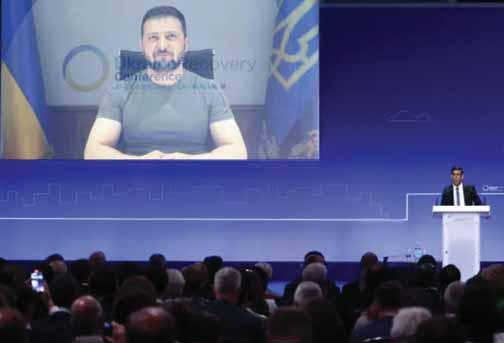
Addressing the conference virtually, Ukraine’s President Volodymyr Zelensky said, “there is currently no place in the world where there is a need to construct and rebuild as many objects as in Ukraine. Every new day of Russian aggression brings new ruins. Thousands, thousands and thousands of destroyed houses, devastated industries, burned lives,” he said.
The UK pledged a new package of financial support for Ukraine, including $3 billion of World Bank loan guarantees, while the US promised $1.3 billion to help it overhaul its energy grid and modernize its ports, railways and other infrastructure. The European Commission President Ursula von der Leyen said the EU would provide Ukraine with 50 billion Euros ($54.5 billion) for 2024-27.
Tbilisi's First Buneba Fest Hailed a Success by Attendees
NEWS PAGE 2
The Essence of Economic Sanctions - Based on Accumulated Material and Practical Observations. Part 3
POLITICS PAGE 5
Sakeni: Where Convenience Meets Luxury - Biograpi's Vision for a Modern Living Experience


BUSINESS PAGE 6
Renew Georgian Visa with 1-Day Departure; Re-Enter for another 365 Days
BUSINESS PAGE 7
Campaign "Women for Women" of Per Te Continues
BUSINESS PAGE 8
Georgians and Armenians Come Together over Wine, Food, and Mimino
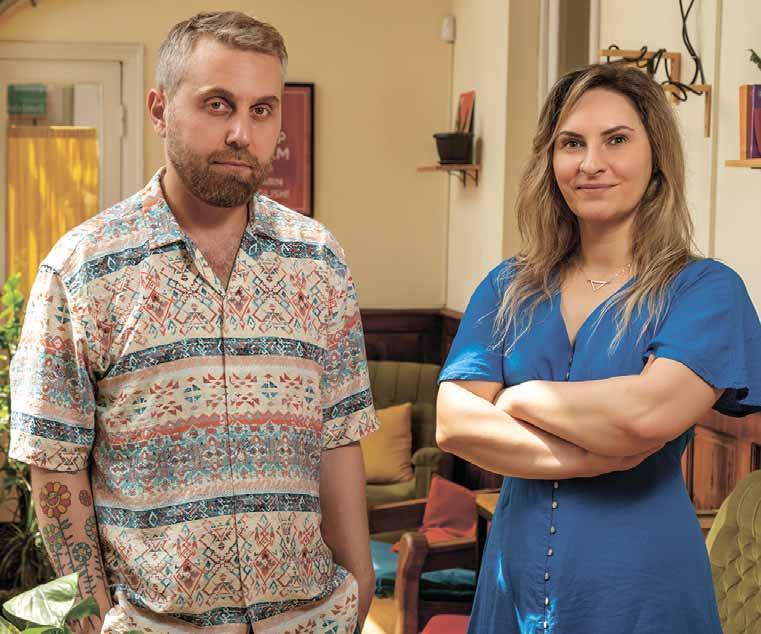
SOCIETY PAGE 10
Rust, Again…
CULTURE PAGE 11
Issue no: 1404 • • JUNE 23 - 29, 2023 • • PUBLISHED WEEKLY
PRICE: GEL 2.50
In this week’s issue...
Continued on page 2 PreparedforGeorgiaTodayBusinessby FOCUS ON BEKA'S SCHOOL Start learning English today at the increasingly popular Beka's School PAGE 9
President Zelensky speaking at the ‘Ukraine Recovery Conference' in London.
Photo by Henry Nicholls | AFP | Getty Images
Tbilisi's First Buneba Fest Hailed a Success by Attendees
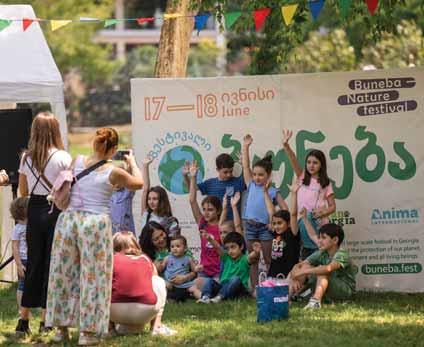
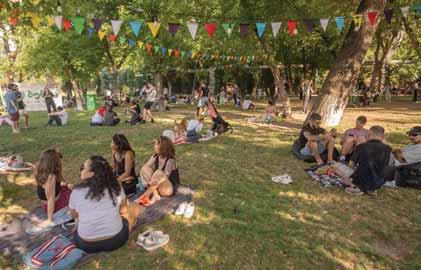
ence, curiosity, and positive energy made the event a vibrant celebration of compassionate living and sustainable practices. We hope you left feeling inspired and empowered to make positive changes in your own lives and communities.
BY KATIE RUTH DAVIES
Tbilisi's first Buneba Fest, held in Mziuri Park June 17-18, received high praise from the NGOs, companies, food venues and guests who attended, many of whom spoke of the positive vibes and family feel-good atmosphere, as well as the "spiritually cleansing" aspect of being somewhere where everyone cares about doing the best for our environment and living a cruelty-free lifestyle for our nature and wildlife. Lower Mziuri Park in Vake hosted not only lectures, masterclasses and foodmaking events, but children's games, a chill-out area in the grassy shade of the trees, and craft activities involving recy-
cled materials to inspire. And while Sunday’s storm put a soggy pause on festivities, organizers and vendors quickly pulled together to restart the fun once the rain had passed.

Guests got to enjoy live music from various DJs, parkour demos, yoga, the best and most delicious of sweet and savory offerings from Georgia's plantbased food chefs, and a market of crueltyfree products such as creams, soaps and shampoos, and a variety of other daily necessities and decorative items that are better for our planet and are either recycled or plastic-free.
While there, many visitors signed the Plant Based Treaty to show their support for green living, and got a little ecogift as a thank you.
“There is something here for everyone of all ages, from fun workshops, games,
performances, informative lectures, even a recycling station, and of course - lots of delicious vegan food! The atmosphere is chill, and everyone is having a good time. This is one of the nicest vegan festivals I've been to so far!” said Plant Based Treaty Georgia’s Hoshimi. “The Buneba Fest was a success for PBT, as we were able to host an educational game about the climate crisis for kids, give a lecture on how a plant-based food system is necessary for the future of our planet, and collect many endorsements for the campaign. We met a lot of like-minded people who care about animals and the environment, and hope to collaborate with them to build a plant-based future.”
“We want to express our deepest appreciation to all the attendees of the festival,” the Buneba Fest organizers wrote on their social media pages. “Your pres-
Thank you for being a part of this transformative experience!”
It is hoped that the Buneba Fest will be the first of many more. Check out their Facebook and Instagram pages for more info.
Ukraine Latest: Putin Says New Nuclear Missiles Ready to Deploy, West Pledges Billions to Help Rebuild Ukraine
Continued from page 1
In other news, Russia’s Ministry of Defense claimed Wednesday that it had intercepted three Ukrainian unmanned aerial vehicles on their approach toward “objects” in the Moscow region.
EU APPROVES 11TH ROUND OF SANCTIONS AGAINST RUSSIA
The European Union has approved its 11th sanctions package against Russia over its war in Ukraine. Sweden, in its role as President of the EU, tweeted out the news Wednesday, saying, “The package includes measures aimed at countering sanctions circumvention and individual listings.”
President of the European Commission Ursula von der Leyen said the move will “deal a further blow to Putin’s war machine, with tightened export restrictions targeting entities supporting the Kremlin.”
The union notes that its sanctions do not target a country or population, but are always targeted at specific policies or activities.
The Associated Press reported that the sanctions forbid transit via Russia of an expanded list of goods and technology which might aid Russia’s military or security sector. Importantly, they place restrictions on the sale of sensitive dualuse goods and technology to third coun-
tries that might sell it on to Russia. The package adds a further 71 persons and 33 entities to those banned from the EU and with EU assets frozen, for involvement in illegal deportation of Ukrainian children to Russia, according to the AP.
NO SHIPS HAVE LEFT UKRAINIAN PORTS IN PAST TWO DAYS AS EXPIRY OF BLACK SEA GRAIN DEAL LOOMS
No ships carrying agricultural products have left Ukrainian ports under the Black Sea Grain Initiative in the past two days, according to the UN-backed organization responsible for collecting export data.
The Black Sea grain deal was brokered between Ukraine, Russia, the United Nations and Turkey in July 2022 and faces expiry next month. The agreement established a humanitarian sea corridor for agricultural products for global destinations.
UN SECRETARY GENERAL DISAPPOINTED BY SLOW PACE OF VESSEL INSPECTIONS FOR BLACK SEA GRAIN DEAL
United Nations Secretary-General Antonio Guterres called on all signatories of the Black Sea Grain Initiative to “do their utmost to ensure the continuation of this vital agreement, which is up for renewal
on 17 July,” according to a new statement released by a UN spokesman.
“The Secretary-General is disappointed by the slowing pace of inspections and the exclusion of the port of YuzhnyPivdennyi from the Black Sea Initiative. This has resulted in a reduction in the movement of vessels coming in and out of Ukrainian seaports, leading to a drop in the supply of essential foodstuffs to global markets,” Farhan Haq, deputy spokesman for Guterres, wrote in a statement.
Ukraine has previously blamed Russia for delaying inspections at the ports and creating a backlog of vessels.
According to the UN statement, food exports through the Black Sea grain corridor have “dropped significantly from a peak of 4.2 million metric tons in October 2022 to 1.3 million metric tons in May.”
PUTIN DOWNPLAYS UKRAINE’S COUNTEROFFENSIVE
Russian President Vladimir Putin downplayed Ukraine’s counteroffensive, saying Moscow had seen a “lull” in action and that Kyiv was seeing heavy losses, according to comments reported by Reuters that cited Russian news agency Interfax.
Ukraine could lose its fighting capacity as a result of those purported losses, Putin claimed, adding that Kyiv already
understood that it had “no chance” in its counteroffensive.
Ukraine’s military reported earlier Wednesday that it had made some partial gains in its counteroffensive in the south of the country but that fighting was intense.
PUTIN SAYS RUSSIA’S NEW SARMAT NUCLEAR MISSILES SOON READY FOR DEPLOYMENT
President Vladimir Putin said on Wednesday that Russia’s new generation of Sarmat intercontinental ballistic missiles, which are capable of carrying 10 or more nuclear warheads, would soon be deployed for combat duty.
In a speech to new graduates of military academies, Putin stressed the importance of Russia’s “triad” of nuclear forces that can be launched from land, sea or air.
“The most important task here is the development of the nuclear triad, which is a key guarantee of Russia’s military security and global stability,” he said.
“Already about half of the units and formations of the Strategic Missile Forces are equipped with the latest Yars systems, and the troops are being reequipped with modern missile systems with the Avangard hypersonic warhead.”
The first Sarmat launchers would be put on combat duty “in the near future”,
Putin said.
UKRAINE SEEING ‘PARTIAL SUCCESS’ IN SOUTHERN COUNTEROFFENSIVE
Ukraine’s armed forces said they are gaining ground in their counteroffensive in the south of the country.
Andriy Kovalev, spokesperson of the General Staff of the Armed Forces of Ukraine, said Ukraine’s troops continue to conduct offensive operations in the Melitopol and Berdyansk areas of Zaporizhzhia.
“On the directions NovodanilivkaRobotyne, Mala Tokmachka - Verbove, Vilne Pole - Makarivka, they had partial success, they are gaining ground at the achieved milestones,” he said, according to comments posted on the Military Media Center on Telegram.
Kovalev added that Russian forces focused their main efforts “on conducting defense and preventing the advance of Ukrainian troops, using reserves, trying to restore the lost position.”
Defense forces of Ukraine continue to hold back the advance of Russian troops in the east of the country, Kovalev added, noting that “especially heavy fighting” continues in the Lyman area of Donetsk.
“Offensive actions were carried out in the direction of Bilogorivka - Shipylivka, they were partially successful,” he said.
GEORGIA TODAY JUNE 23 - 29, 2023 2 NEWS
Photo by Alex Oildigger
Photo by Alex Oildigger
Photo by Alex Oildigger
Council of Europe Monitoring Body Says Racism and Intolerance against Groups in Vulnerable Situations Remains a Problem in Georgia, Despite Certain Progress
Despite some progress at legislative and policy levels in Georgia since 2015, racism and intolerance against some ethnic and religious groups and, in particular, against LGBTI persons remains a problem, teaching of Georgian to historical ethnic minorities is still vastly insufficient, and government officials and politicians undermined the reputation of the Public Defender (Ombudsman), which includes the function of national equality body, says the European Commission against Racism and Intolerance (ECRI), a Council of Europe monitoring body, in a new report published Thursday.
Since the adoption of ECRI’s previous report on Georgia in 2015, progress has been made and good practices developed in several fields. In particular, a civic education course on intercultural relations for schoolteachers has been successfully developed, the number of violent attacks against Jehovah’s Witnesses has significantly decreased, and 78 Roma persons have received identification documents.
In the first few months following Russia’s full-scale invasion of Ukraine in February 2022, nearly 50,000 Ukrainians fleeing the war entered Georgia. Initial accommodation, healthcare and education were made available to them. There was generally a very welcoming attitude towards them in Georgian society. In its report, ECRI recommends developing a longer-term sustainable plan in support of people displaced from Ukraine.
At the same time, tens of thousands of Russians also arrived in Georgia. When anti-Russian resentment and discriminatory treatment occurred, the authorities took swift action, including in consumer rights regulations. The Public
Defender and the Council of National Minorities spoke out against negative stereotyping and hate speech against Russians. ECRI considers this a good practice.
Despite the progress achieved, some issues give rise to concern. Certain activities of the Public Defender, linked to a specific part of the institution’s mandate (and the situation of imprisoned former President Mikheil Saakashvili), attracted harsh criticism from some government officials and politicians, thereby also a negative impact on the Public Defender’s work in areas of relevance to ECRI. In its report, ECRI recommends that the authorities ensure that politicians, particularly government members, refrain from comments undermining the credibility, independence, and reputation of the Public Defender’s institution.
Despite the decrease in violence against Jehovah’s Witnesses, religious intolerance remains an issue in Georgia. In its report, ECRI notes that its previous priority recommendation concerning religious discrimination and intolerance (including disputes about religious property) has still not been implemented.
ECRI also strongly recommends that the authorities focus their policies in the area of religion on the principle of nondiscrimination and the promotion of religious tolerance.

The level of teaching of Georgian as a second language to non-mother tongue speakers among the historical ethnic minorities in the country is still vastly insufficient. ECRI recommends, as a matter of priority, that the Georgian authorities significantly increase the number of hours of teaching of Georgian as a second language in minority schools at the primary and secondary levels.
ECRI will follow up on the implementation of this recommendation within the next two years.
There is also no joint working group of government and NGO representatives, notes ECRI, to discuss LGBTI equality issues, no possibility to register samesex partnerships, and no clear criteria for legal gender recognition. ECRI recommends addressing these issues.
In July 2021, large-scale counter-demonstrations against an LGBTI March in Tbilisi descended into violence against participants, organisers and journalists. In the view of ECRI, these attacks should
be effectively investigated, perpetrators held to account and such acts prevented from re-occurring in the future, including through a review of police operations during such events.
Hate speech, especially online, against LGBTI persons has been a growing problem, and there is no effective monitoring system for racist and anti-LGBTI hate speech. Similarly, there has still been no specialist unit set up within the police to deal specifically with hate crime cases. Against this background, ECRI recommends establishing an effective monitoring system for hate speech and to
assess the impact of the training activities, including for law enforcement officials and prosecutors dealing with hate crime cases.
* * *
The European Commission against Racism and Intolerance (ECRI) is a unique human rights body that monitors action against racism, discrimination (on grounds of “race,” ethnic/national origin, colour, citizenship, religion, language, sexual orientation, gender identity and sex characteristics) and intolerance in Europe. It prepares reports and issues recommendations to member states.
EU and UNDP Inaugurate Renovated Clinic in Mejvriskhevi Village
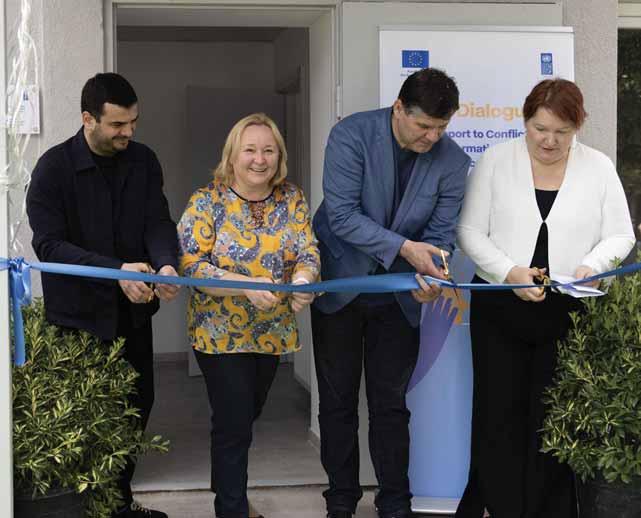
The European Union (EU) and the United Nations Development Program (UNDP), together with national partners and local medical personnel, inaugurated the renovated building of the Mejvriskhevi village outpatient clinic in Georgia’s Shida Kartli region. The clinic provides vital health services to over 6,000 people, including more than 1,000 children, residing in the villages adjacent to the administrative boundary line with Tskhinvali region/South Ossetia.
The comprehensive refurbishment project included the installation of plumbing, electrical and heating systems, as well the improvement of interior design. Furthermore, the space in the clinic was renovated to ensure accessibility for people with disabilities, promoting inclusivity and equitable healthcare. To further enhance the clinic’s functionality, new furniture and medical equipment were also supplied.
On 21 June, representatives from the EU and UNDP paid a visit to Mejvriskhevi village, where they met with local authorities, communities, and stakeholders to assess the progress of ongoing healthcare initiatives and other support projects.
The delegation included Radica Nusdorfer and Kristi Raidma from the European Commission’s DG NEAR, and Anna Chernyshova, UNDP Deputy Resident Representative in Georgia. Accompanying them were Abiko Abesadze, Deputy State Representative in Shida Kartli Region; Tamaz Shioshvili, Deputy Gori
Mayor; and representatives from Georgia’s Government Administration, Health Ministry, and the State Minister’s Office for Reconciliation and Civic Equality.
“The European Union working with international and local partners supports Georgia’s efforts to strengthen essential services and enhance the resilience of local communities affected by conflict. We are proud that with this project we will be able to ensure improved access to health to more than 6,000 people,” said Radica Nusdorfer, Head of Sector in DG NEAR, European Commission.
“At UNDP, we firmly believe in leaving no one behind, especially when it comes to vital services, such as healthcare. The renovation of the outpatient clinic in Mejvriskhevi village ensures inclusive and equitable access to medical care for vulnerable communities, including people displaced or affected by conflict and people with disabilities. UNDP is honored to work with the European Union and our local partners in this transformative initiative,” noted Anna Chernyshova, UNDP Deputy Resident Representative in Georgia.
The renovation of the outpatient clinic in Mejvriskhevi village has been implemented as part of the EU-funded EU4Dialogue project focused on improving the lives and livelihoods of local communities affected by conflict. This support extends to a range of villages across Georgia where the EU and UNDP help enhance access to healthcare and other basic services for people living alongside administrative boundary lines.
GEORGIA TODAY JUNE 23 - 29, 2023 3 NEWS
Image source: UNA
The Rise of the Middle Powers
being caught in the great power competition between China and the US. By avoiding the struggle, they thrive amid Beijing-Washington competition by stirring their own, seemingly independent geopolitical course, which ultimately aims at elevating their respective geopolitical might.
One of the strategies used by the middle powers is to avoid geopolitical fixation on any major power. This is what Saudi Arabia has been doing over the past couple of years and especially in the recent months. With its rapprochement with Iran, the Kingdom now tries to limit its security dependence on the US. But the most critical element here is China’s role. Beijing facilitated IranSaudi normalization, but this in no way means that Saudi Arabia is dodging its close security ties with the US in favor of alignment with China. Instead, Riyadh wants as many foreign policy choices as possible.
Eurasia. Source: Alamy/Dragan Jelic
ANALYSIS BY EMIL AVDALIANI
Great power competition between the US and China is a fashionable topic. Comparisons abound with the Cold War era or the nineteenth century, when multiple actors in Europe competed with each other in the region and more globally. What is less discussed though is the emergence of a group of countries often referred to as “middle powers”. While attention is paid to what Washington or Beijing are doing
to prevail in their competition, the middle powers could hold the key in the widening China-US rivalry.
It is hard to enumerate the exact elements that characterize certain countries as middle powers, but they mostly fall into a category of states that strive to increase geopolitical influence in their immediate neighborhood and occasionally play a pivotal role in the wider regional context. Those efforts, however, should be consistent, not limited to a short period of time, and bear resemblance to a well-thought-out, long-term strategic calculus.
Such states are Turkey, Saudi Arabia,
Iran, and India - long-established middle powers. But there are also emerging ones such as Kazakhstan and to a certain extent Azerbaijan. Yet the success of these emerging middle powers is far from guaranteed. One of the prerequisites for a true middle power is its geographic position. They mostly border upon smaller and much weaker states. In the case of Kazakhstan and Azerbaijan, however, they border on bigger states such as Russia/China and Iran/Russia respectively, which limit these two’s potential to project power beyond their borders.
The established middle powers fear
In the middle powers’ thinking, despite the challenges, the present China-US geopolitical competition also presents multiple opportunities. One of them is exactly what Saudi Arabia is doing – it hails closer ties with China but only to extract bigger concessions from the US. The longer this game continues, the bigger are the opportunities and possibilities for Riyadh to increase its profile as a critical regional power.
The two other actors, Turkey and Iran, have been pursuing similar policies for nearly a decade. For instance, Ankara undid its fixation on the West and looked eastward, deep into Eurasia, to find a balance to its foreign policy which would
better align with the country’s geographic situation and grander political aspirations. The Eurasian twist has been visible all along in Iran’s foreign policy too. Pressured by the West, Tehran looks to other actors to find balance and thereby fortify its negotiating position.

The middle powers are highly selfinterested. They feel how increasingly needed they have become in the present geopolitical landscape. Their relative power has grown, and is likely to continue doing so as the US, China, and Russia devise various tactics to win them over. The middle powers are not prosomeone; instead, they have their own agency and regional ambitions. For them, non-alignment now seems increasingly to be a winning strategy and a multivectorial foreign policy as an optimal response to the vagaries of the present world.
The middle powers are a direct result of the changing world order, which is becoming increasingly multipolar. This would have been impossible in the Cold War era when the world was strictly divided into two geopolitical blocs. The present scenario, if anything, resembles the pre-World War I situation, when multiple great and middle actors competed and shifted alliances. Overall, the role of the middle powers is now central to the China-US competition. Whoever manages to woo the Global South will hold the key to shaping the future world order.
Emil Avdaliani is a professor of international relations at European University in Tbilisi, Georgia, and a scholar of silk roads.
The Informational Bias
OP-ED BY NUGZAR B. RUHADZE
The news industry in Sakartvelo is flagrantly predisposed, behaving that way without any pang of conscience. When I say ‘news industry,’ I mean a huge bunch of people, engaged in the multifaceted and complicated process of receiving, processing and feeding information to the population of the country. The tendency is so strong that most of our journalists take it for granted that they should openly demonstrate their political preferences, corporate partiality and appetite for pecuniary advantage. More often than not, in this political culture, partisan prejudices preponderate objective reporting and a plain, disinterested description of facts. Hence, not many Georgian newscasters and columnists would embrace the famous British adage that comments are free, but facts are sacred. Bias is usually exposed in covering events, seen in radically different colors and hues, depending on which political force this or that medium is associated with. The stories to be brought to the attention of their readers, listeners and viewers, are not selected by means of gravity of content, but based on the attitudinal whims of the individual journalists, in conspiracy with their patrons and engagers. No story will be covered unless the content is in unison with the editorial policy and ideology of a particular medium of mass communication. One may call this kind of choice a form of “freedom of speech,” - ‘I will say and do whatever I think is right’. OK, granted, but how to handle the truth? Has the truth lost its classic traditional value? Do we need the truth at all in order to live a good life?
The informational bias is manifested in many different ways, in sensationalism, political affiliation, spin, angle and wording. Some people might argue that bias is not a big deal because we are all

individual human beings, who are entitled to see things the way we see them. because all of us have our preferences that have to be respected. On the other hand, personal and political predilection in presenting the news might be evaluated as something harmful and destructive in the sensitive process of treating the news consumers fairly and loyally.
When journalists are biased, they must know they are damaging the process of national development, having a pernicious effect on a younger generation’s vision of the future. It is so easy to mislead young men and women! It would not be an exaggeration to say that the contemporary Georgian politics and its mirror, the media, are full of distortions and biases, to which our public has already gotten used to. Moreover, it is hardly imaginable that the people who are handling information in general are angelically pure and unbiased, but it is also a problem to make a crystal-clear difference between the biased and the unbiased. There will always be contradictory arguments provided a certain medium is qualified either biased or unbiased, because calling them biased might be considered unfair, and describing them as unbiased may be an overstatement, so even attempting this kind of assessment is doomed to be attacked by media watchers.
Due to the extant bias in news operations in Georgia, our informational sources are becoming less and less reliable: people read newspapers and think there must be something totally different behind the actual words they are reading; they listen to the radio and doubt if what they hear is true; viewers watch several TV channels at their disposal and are surprised at the uncanny difference between them in the ways they interpret the same facts; and those who spend their time browsing the Internet take the numerous blogs and comments with misgivings and raised eyebrows. So, why waste time on the information that we a-priori render as garbled and
aimed at manipulating our brains (which are strained and overloaded anyway)?
The conventional wisdom would have it that the manipulated morale and intel-
lect may very well be the prerequisite for our nervous breakdown if the manipulation is overdone. Meanwhile, let us be without doubt that we are strongly
and regularly manipulated by our media, which has enough power to keep both our wits and spirits caught in their strong and sharp tentacles.
GEORGIA TODAY JUNE 23 - 29, 2023 4 POLITICS
Image by: Phoebe Radke / Illustrator
The Essence of Economic Sanctions - Based on Accumulated Material and Practical Observations. Part 3
ANALYSIS BY VICTOR KIPIANI, GEOCASE CHAIRMAN
In addition to the materialized results of sanctioning, there is another issue with an intangible connotation that should generally be looked at. This is the moral obstruction caused by the sanction, a kind of shaming of the sanctioned subject, in short, the stigma from the perspective of the audience.
The issue of moral categories in this regard is, of course, the subject of extensive discussion and includes many social, psychological and other aspects. However, within the framework of this article we would like to offer a couple of opinions on only one aspect, which is the creation of a crack in the political and business elite of an authoritarian country as a result of the sanctions and the fragmentation of the elites. Practically one o,f the goals of the sanctions policy, along with changing the target's behavior with regard to the external course, is to distance its leadership from political and business support and, as a result, to loosen the unconditional control of the target's leadership.
The manifestation of the same result is stigma as an assessment, which is socially fatal for the sanctioned system of governance because (theoretically!) it foretells serious harm, namely, the denial of critical public support within the country, and international isolation outside the country. Both, separately or together, lead to the collapse of the regime.
Clearly, this is only a theoretical part of this phenomenon, and how effective it will be in reality depends on the target's perception of the "stinging effect" of stigma, as well as on how much it considers social norms and the category of reputation. Looking at Russia's current political and military leadership, we can say that the answer to all the relevant questions is clear from the start and does not require further study of the topic.
As has been said, it is more about fragmenting the supporter base which should lead to effective change. As has been mentioned many times, it is one thing to deplete the target's resources, but a second and much more difficult challenge is to normalize its behavior. Thus, to achieve the second task, creating a crack from within, the introduction of a social payment for business or other elites for relations with stigmatized lead-
ership is one of the contributing steps. It should also necessarily be noted that this price has not only social content, it is directly linked to the refusal of the material, informational or human assets of elites.
It is evident that the stigma of sanctioning has so far had only a symbolic effect on Russian business and social elites. This is how it is seen, read and perceived from a distance. Naturally, the facts of having a firm civic position by individuals cannot have a decisive influence on this assessment. In Russia, even a process called "protest with one's feet" - leaving the country - will not succeed as an acute protest. This, too, is a highly controversial, unambiguous event, to which we will probably devote a separate article.
TO SEIZE OR NOT TO SEIZE?
Since the start of the war in Ukraine, a number of Russian assets have been arrested in various jurisdictions. In general, arrest is one of the popular tools of sanctions pressure. In such cases, generally, the arrest remains in effect until the goals of the sanctions are achieved or another decision is made by the initiator of the sanctions.
At the same time, this seemingly straightforward legal action has given rise to several legally problematic nuances.
For example, it has become necessary to identify the criminal nature of the origin of arrested property, to justify this connection. In the current circumstances, this is not always possible: not only because of practical difficulties, but also because of inadequate legislation in some places. We are talking about the receipt, accumulation and possession of property in violation of international sanctions, say, through a crossborder covert operation or through a criminal offense.
The issue became even more topical and acute when it came to the confiscation of frozen assets. Additional sensitivity arose when the West initiated a discussion about directing confiscated Russian assets to rebuild Ukraine's infrastructure. The aforementioned criminal background check has become much more demanding and often difficult to overcome. And the actions of individual countries, such as Estonia or Canada, could not bring legal clarity to the confiscation of frozen property under sanctions.
There is another risk associated with the seizure of Russian assets without proper evidence: retaliatory steps by Russia against Western assets. Obviously,
with the Russian Federation's disrespect for international norms, this risk already exists. However, it is also a fact that any arbitrary legal action by the West will significantly lower the "bar" of imperative legal requirements for asset confiscation by Russia.
Thus, it is one thing to arrest an asset and another thing to seize it from the owner. Even in the context of developed Western law, the former is relatively less complicated challenge, while the latter is associated with a significant legal problem - the quality of the burden of proof. For example, current sanctions legislation in the United Kingdom has revealed a number of practical flaws in terms of the impregnability of identifying the assets of Russian public officials under the so-called "corporate guise". And in the United States, the granting of a high degree of discretion with respect to asset forfeiture has divided opinion among scholars and practitioners. Some of them still argue that in the current legal environment, confiscation of property without a standard of good cause can be considered a violation of the constitutional principle of "due legal process." It was also suggested that in a number of cases, especially in connection with privately owned property, it would be difficult for Western agencies to firmly establish the criminal origin of property without communication with the relevant authorities of the Russian Federation.
Another problem directly related to this topic comes from existing bilateral and multilateral international agreements with the Russian Federation, especially with regard to the resolution of investment or commercial disputes by arbitration. And here the member states of the Western coalition have a choice between a relatively "aggressive" and a relatively "moderate" approach. And the final answer to the legality and validity of one or the other approach should be sought in future arbitral awards.
We also wish to note that the answer to all possible scenarios in connection with the immunity of state assets in international law has not yet been developed. And although there seems to be a common understanding of "sovereign immunity," an exhaustive view has not been created of all cases of the "sovereign immunity" exceptions, where one state can arrest the assets of another state without any legal risk. The effect of Western sanctions against Russia is expected to enrich and add much in this regard to a better understanding of the
scope of "immunity".
Thus, in the case of a judicial appeal, there is a risk of overturning a legally unsubstantiated act of confiscation by imposing compensation on the implementing party. Legislative and judicial practice will probably take care to minimize such risks. However, much greater clarity and better reasoning around the problem will be possible as a result of specific judicial proceedings.

THE UNIVERSALITY OF THE SANCTION?
Economic sanctions have taken a firm place among the main means of achieving foreign policy goals. Moreover, given the growing trend of their use, they have become almost a universal "geo-receipt". Here it should also be noted that the United States of America, as the main determinant of fashion in sanctions policy, is characterized by a particular propensity for economic coercion measures. It is enough to cite just some data to substantiate this assertion. For example, during President Obama's first term, the United States imposed sanctions on an average of 500 entities per year, and during Trump's presidency this number has almost doubled.
However, as mentioned above, statistics are statistics, and the effectiveness of economic sanctions in the geopolitical arena is associated with a number of challenges and problematic issues in its use as a so-called "means of broad domestic consumption". In previous publications, we have repeatedly mentioned that, based on authoritative sources, the sanctions policy worked only in a third of cases. Objectivity requires us to add that the last such systematic study was conducted by the University of North Carolina in 2014 and, in all likelihood, the data would have changed somewhat since then.
AS A SUMMARY
The practice of Western sanctions in response to Russia's renewed invasion of Ukraine has given new perspective to the debate on this issue and raised a number of additional questions.
One of the main questions is whether the idea that economic sanctions will always serve as an adequate substitute for military or diplomatic means is valid. It is clear that there are many crises for which the military route is ineffective and the diplomatic solution is accompanied by a sense of scarcity. But does economic sanction fully cover what both of these methods fail to do?
Thus, in contrast to the "broad domes-
tic" use of sanctions policy, we should once again note the need for its selective application in a "sparing" mode. It should be additionally recalled that in order to be targeted and effective, an acceptable decision on economic coercion should be precisely adapted to the task at hand; and specific steps should have specialized content and be taken together with the implementation of other possible measures in a complex.
Let us once again draw attention to the requirement for a clear understanding of the full cycle of economic sanctions - all phases: from the motives for their introduction to the conditions for the removal of sanctions. In addition, in order to choose a measure of economic coercion, it is advisable to conduct a full stress test for its deterrent effect, as well as to analyze the expected consequences on one's own economy in order to reduce their negative impact.
There is another circumstance related to sanctions, which was particularly evident in the context of the war in Ukraine: in parallel with the imposition of economic sanctions on the target by the initiator, it is easy to inflict some economic damage on the systems of allied and partner countries. It is also difficult to define coercive measures in terms of their content, duration and scale so as not to antagonize allies or supporters. Here it should be said again that "scale" does not always equal "effectiveness" and that the specific questions - What? For what? How? - also require specificity of actions, which boils down to mechanics.
In short, issues related to economic sanctions cannot be subjected to a precise theoretical definition or static assessment. This is not surprising, since the world economic structure is thoroughly transforming before our eyes, modern technology is developing rapidly, the texture of societal and social relations is changing, resulting in the formation of a new operational code of geopolitical behavior, of which the geoeconomic component is an integral and organic part. Therefore, there is an obvious need for constant observation, assessment and harmonization of economic sanctions and their transformative nature, including in Georgian political and research circles. Along with academic interest, the study of the sanctions problem has a practical load: it helps to better understand a world in which our country's coexistence with others is characterized by a significant increase in competition and selfishness in international relations.
GEORGIA TODAY JUNE 23 - 29, 2023 5
Image source: attorneydocs
POLITICS
Sakeni: Where Convenience Meets LuxuryBiograpi's Vision for a Modern Living Experience
 BY MARIAM GORKHELASHVILI
BY MARIAM GORKHELASHVILI
Biograpi, a brand member of the renowned Wissol Group, is making waves in the Georgian market with its innovative approach to urban development. Last year, Biograpi entered the development market, aiming to revolutionize the country's urban sector. One of their flagship projects is the remarkable Sakeni complex, which promises to set new standards for comfortable living and convenience.
Sakeni, located at Vazha Pshavela #25, is a multi-story complex boasting modern architecture and an inviting interior. It is designed to provide residents with a holistic living experience, blending historical motifs with contemporary aesthetics. Biograpi's emphasis on creating an organic and homely environment sets Sakeni apart from conventional developments.
"The construction of the building has already started and the complex will be completed within the given time frame, which is 42 months. The investment in the Sakeni project exceeds 70 million dollars," said Vasil Pkhakadze, executive director of Biograpi, speaking to Georgia Today.
Biograpi recently signed a memorandum with various commercial partners for the Sakeni project. These partnerships are set to introduce an array of premium amenities within the complex, catering to the diverse needs of its residents. Notable establishments include:

• Gastronome: A premium delicatessen store, offering a wide range of highquality products.
• Octopus: A 25-meter pool and fitness center, providing a space for exercise and wellness.
• Paul: A French restaurant, serving delectable culinary delights with a touch of elegance.
• Bistro Gastronome: Italian Restaurant,
offering authentic flavors and a cozy dining experience.
• Dunkin: An American restaurant, bringing best coffee in the city, delicious treats and beverages to satisfy cravings.
• Ska: A healthy food chain, providing nutritious options for those seeking a balanced lifestyle.
"First of all, we are very happy that a Gastronome Group will participate in this project. We will be represented by two brands, it will be Gastronome - a premium class delicatessen store with entirely different concept and Bistro Gastronome, an Italian restaurant that is already successfully operating in the market. The latter will be presented in Saken with a large terrace and a diverse assortment," said Giorgi Getiashvili, Director of Gastronome.
By bringing together these renowned brands, Biograpi aims to create a thriving ecosystem within Sakeni. This diverse range of establishments ensures that even the most discerning customers will find their desired products and services conveniently located under one roof. Sakeni's central location in the heart of the city further enhances its appeal.
Residents will enjoy easy access to the largest Gastronome hypermarket in Tbilisi, making shopping a breeze. The presence of Octopus fitness hall, tennis courts, and Co-working space promotes an active and collaborative lifestyle. Furthermore, the lush 2,000 sq.m. green yard offers a
serene space for relaxation and rejuvenation. In addition to the commercial and recreational amenities, Sakeni will house a spa and aesthetic center, a pharmacy, a bank, and various other valuable offerings. These facilities are strategically integrated to ensure residents can efficiently manage their daily needs while enjoying significant time and energy savings. Sakeni aims to provide a comfortable and fulfilling environment where residents can focus on living a healthy life and nurturing human connections.
Biograpi's projects are distinguished by their implementation of modern smart architecture technologies and ecofriendly approaches. The construction process prioritizes energy efficiency, utilizing premium-quality European or local materials. The integration of the latest thermal and acoustic insulation and safety systems ensures a secure and comfortable living space for residents. Biograpi's commitment to quality and excellence reflects its dedication to providing a better life for its customers.
"Dunkin has been operating in the market since 2015, we count up to 80 restaurants in the Georgian market already, we are a member of Wissol Group, therefore we are participants and supporters of this project from the very beginning. It is undoubtedly a very interesting project since it is one of the premium locations, so we will be happy to offer our customers the tastiest coffee
and other delicious products in the city," said Giorgi Mshvildadze, the director of the company.
With the Sakeni development project, Biograpi is redefining the urban living experience in Georgia. The harmonious blend of commercial partners, extensive amenities, and a well-designed living environment makes Sakeni an attractive choice for those seeking a comfortable and convenient lifestyle. Biograpi's vision to create a vibrant living environment where residents can socialize and enjoy human relationships. Beyond Sakeni, Biograpi has ambitious plans for the development market in Georgia. In addition to this flagship project, they are set to develop two more multifunctional complexes: "Matiani" on Tsereteli Avenue and "Hisni" on Ketevan Dedopali Avenue. These upcoming projects will seamlessly integrate residential, commercial, and office spaces, further enhancing the urban landscape and providing residents with a comprehensive and interconnected living experience. Biograpi's approach to construction goes beyond aesthetics and convenience; they prioritize sustainability and eco-friendliness. The use of energy-efficient constructions built on solid rock foundations ensures long-lasting and environmentally conscious structures.
The Wissol Group, with its 25-year history of successful business operations, brings a wealth of experience and expertise to Biograpi's endeavors. This partnership ensures that Biograpi operates with a solid foundation, guided by a commitment to excellence and customer satisfaction. This innovative development promises to elevate the standards of urban living in Georgia, offering a seamless blend of convenience, luxury, and sustainability. Biograpi's dedication to creating a better life for their customers shines through every aspect of the Sakeni project, from the carefully selected commercial partners to the state-of-theart construction techniques employed. In conclusion, Biograpi's Sakeni development project represents a significant milestone in Georgia's urban renewal landscape. The collaboration with prestigious commercial partners, the focus on convenience and time-saving amenities, and the commitment to quality and sustainability all contribute to making Sakeni a coveted living destination. With its vision for holistic living and its determination to set new industry standards, Biograpi is poised to leave a lasting impact on the development market, enriching the lives of residents and establishing itself as a beacon of innovation and excellence.
Introducing Microbanks - New Financial Institution in Georgia
BY MG LAW OFFICE

Earlier this year the Parliament of Georgia adopted the Law of Georgia on Microbanks (hereinafter the “Law”) establishing a new financial institute in Georgia.
The main reason for the adoption of the Law was the institutional development and strengthening of the nonbanking financial sector by the National Bank of Georgia (“NBG”). Moreover, compared to microfinance organizations, the microbanks will substantially reduce costs and enhance access to local and international financial markets. This will consequently contribute to reducing the cost of credit products and fostering increased competition.
Microbanks will be an addition to the Georgian non-banking sector which now encompasses microfinance organizations and lending entities. Given their crucial role in providing financial support to businesses and the population in Georgia's regions, it became imperative to establish a distinct regulatory and supervisory framework for business models with varying contents, despite their similar status. This resolution is also in line with the need to enhance oversight over the non-banking institutions.
Under the Law, a microbank is a legal entity established in the form of a joint stock company which is licensed by NBG and is carrying out the banking activities as set out in the Law. Microbanks operate as financial institutions and serve as intermediaries between microfinance organizations and commercial banks.
Their primary focus lies in lending to individuals who generate income through entrepreneurial endeavors, including agricultural activities. To maintain their distinct business model, at least 70% of the microbank's credit portfolio consists of loans issued for entrepreneurial loans and/or the loans whose source of repayment is income from entrepreneurial activity.
It is noteworthy that the regulatory framework for microbanks will be different from other banking or non-banking institutions in terms of obtaining a license. In particular, while a commercial bank requires a capital of GEL 50 million, and a microfinance institution requires GEL 1 million, microbanks are mandated to have a charter capital of GEL 10 million to obtain a license. Additionally, microbanks shall not issue a loan exceeding GEL 1 million.
The Law limits the banking activities of the microbanks to the following:
• issuance of loans, guarantees, letters of credit and leasing, carrying out factoring operations within the limit established by the Law;
• attracting interest-bearing and interest-free demand and time deposits only within the limit established under the Law of Georgia on Deposit Insurance System as well as above the limit, servicing of current accounts in compliance with the liquidity requirements determined by NBG; as well as raising other repayable funds, including from individuals (including individual entrepreneurs) in accordance with the Law;
• opening and servicing of correspondent accounts;
• implementation of cash and non-cash payment operations and cash-collection
services;
• issuance of payment cards and organizing their circulation;
• implementation of payment services, operation of the payment system, performance of settlement agent functions;
• provision of interest-free banking services;
• placement of derivatives, selling and purchasing of securities with own funds, except for the cases where the said activity requires a brokerage activity license;
• sale and purchase of foreign currency with own and clients’ funds;
• lease of property only for micro banking activities;
• provision of virtual asset services in favor of another person in accordance with the Law of Georgia on the National Bank of Georgia; and
• other services related to each of the above activities.
Microbanks will also be authorized, with the approval of NBG, to carry out the activities allowed for the brokerage company under the Law of Georgia on the Securities Market in accordance with
the requirements established by the laws of Georgia.
The Law, among others, sets out the requirements for licensing of microbanks, the capital and reserves of the microbanks, the manner and limits of investments, the issues of transformation of the microbanks into a commercial bank, merger with the microbanks and division of the microbanks. The Law further regulates the issues of corporate governance, both the compatibility of the organizational structure and the criteria of the suitability of the governing bodies, the main issues of the formation and responsibility of the supervisory board, the directorate, and the issues of protection of bank secrecy and access to it.
As the Law regulates, a microfinance organization is authorized to apply for a microbank license. Under the Law of Georgia on Microfinance Organizations, a microfinance organization is generally authorized to provide various types of microloans, issue credit cards, invest in securities, handle remittances, act as an insurance agent, etc. However, after the
introduction of the Law, applying for a microbank license shall also grant the microfinance organizations the authority to issue loans to individuals earning income from entrepreneurial activities (for example, agricultural activities) and combine other authorities granted to microbanks under the Law.

In case a microfinance organization applies for a microbank license, it is required to refrain from accumulating pledged assets for a period of two years from the date of receiving the microbank license, except for the monetary instruments of the NBG, which is necessary to ensure liquidity support. Moreover, during this period microbanks will have different individual requirements with respect to the liquidity coefficient. The Law shall enter into full force on 1 July 2023 and NBG shall issue acts stipulated by the Law by the said date.
The implementation of the Law is highly anticipated to have a significant positive impact on the country's financial sector and overall economy. The expected effects include fostering healthy competition, enabling the provision of better quality and diverse financial services to customers, stimulating investments, enhancing organizational capacity and business assets, and supporting the growth of small and medium-sized businesses. These outcomes hold the potential to increase profitability, generate more employment opportunities, particularly in the regions, and contribute to the overall economic prosperity of the country.
As we look ahead, the Law presents a promising framework for fostering a robust and vibrant financial landscape that benefits both businesses and consumers alike.
GEORGIA TODAY JUNE 23 - 29, 2023 6 BUSINESS
This is the third article of the regular Klein Law Group column. To read the previous article on setting up a company in Georgia, please visit the link below.

Georgia is not only a tech hub, it is also a very popular destination for digital nomads, especially Americans who have limited ability to stay visa-
Renew Georgian Visa with 1-day Departure; Re-Enter for another 365 Days
dence permits tailored to meet the diverse needs of individuals. The most common ones include:
Temporary Residence Permit: This permit is suitable for those seeking long-term stays in Georgia. It is issued for a period of up to six years and allows individuals to work, study, or engage in business activities within the country.
Permanent Residence Permit: After residing in Georgia for a continuous period of six years with a temporary residence permit, foreigners can apply for permanent residence. This permit grants individuals the right to live and work in Georgia indefinitely, offering the potential for citizenship after a certain period.
environment make it an ideal destination for entrepreneurs and investors. A residence permit enables individuals to establish and operate their businesses, tap into the emerging markets, and benefit from the country's favorable tax regime.
Education and Research: Georgia boasts several prestigious universities and research institutions, offering quality education and research opportunities. Residence permits allow students and researchers to access these institutions, pursue academic excellence, and contribute to their chosen fields.
poses usually do not suffice.
free (for more than 3 months) in Europe and other destinations. In reference to our last legal column, taxes can be as low as 1% (see Legal Insights with Klein Law: 1% Tax Rates for Entrepreneurs and Other Georgian Attractive Tax Rates - Georgia Today)
TYPES OF RESIDENCE PERMITS
Georgia offers different types of resi-
Special Residence Permit: This permit is designed for individuals who have made significant contributions to Georgia, such as investors, highly skilled professionals, or those with exceptional talents in the arts, sciences, or sports. It provides an accelerated pathway to obtaining residency and citizenship.
BENEFITS OF RESIDENCE PERMITS

Obtaining a residence permit in Georgia opens up a plethora of benefits for foreigners.
Business Opportunities: Georgia's strategic location and business-friendly
Healthcare and Social Benefits: Residence permit holders in Georgia can access the country's healthcare system, ensuring comprehensive medical care. They are also entitled to social benefits, including pension schemes, insurance, and other social security provisions.
Schengen and Travel and Visa-Free
Access: Georgian residence permit holders enjoy visa-free or visa-on-arrival access to various countries, including the Schengen Area, Turkey, and several other nations. This facilitates easy travel and exploration of neighboring regions.
GEORGIAN CITIZENSHIP
Georgian citizenship is also available, but this requires investments - investments in real estate for dwelling pur-
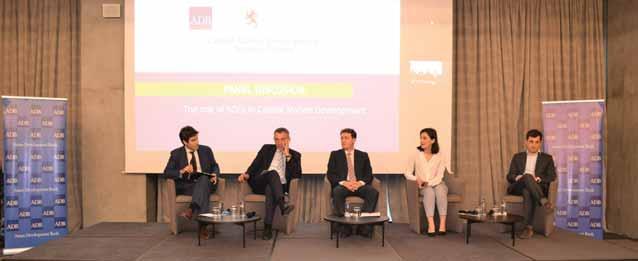
Georgia's residence permits offer a gateway to a vibrant and promising future for foreigners seeking to embrace the country's rich cultural heritage, breathtaking landscapes, and economic opportunities. With a range of permit options, individuals can choose a path that aligns with their goals and aspirations. Whether it's starting a business, pursuing higher education, or enjoying the country's warm hospitality, Georgia welcomes expatriates with open arms. By obtaining a residence permit, individuals can embark on a remarkable journey of personal and professional growth in this enchanting Caucasian nation.
Read the first Klein Law Group column for Georgia Today here.
www.kleinlawgroupgeorgia.com
WB: In Georgia, Economic Activity Remains Robust
Government of Georgia Presents ADB-Supported Georgia’s Capital Market Development Strategy
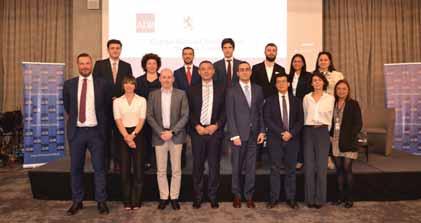
The Asian Development Bank (ADB), in collaboration with the Grand Duchy of Luxembourg, hosted a forum to discuss capital market development in Georgia. The half-day event brought together more than 80 senior representatives including from the government, think tanks, international and private sector organizations, to explore opportunities and challenges in Georgia's capital markets, share knowledge and foster dialogue. With technical assistance from ADB, the Government of Georgia adopted a Capital Market Development Strategy that will serve as a guide for the coordinated and consistent development of the country’s capital market. The strategy also provides a crucial platform for the development partners to coordinate their future support for the country’s capital market development. Giorgi Gurgenidze, Head of Capital Market Development and Pension Reform Department at the Georgian Ministry of Economy and Sustainable Development presented the strategy.
Two panel discussions explored the role of state-owned enterprises (SOEs) in capital market development and sustainable finance in Georgia. Panelists, including from the Georgian central bank, discussed how SOEs can participate in domestic capital markets, including by issuing debt and equity, and list-
ing on the Georgian stock exchange. The experts also discussed the potential for sustainable finance to support Georgia's environmental and social development objectives.
“We are pleased to continue supporting the government’s efforts to deepen local capital markets, enhance market efficiency, mobilize investment opportunities, and promote sustainable economic growth,” said Kamel Bouhmad, Officer-in-Charge, ADB Georgia Resident Mission. “By leveraging our technical expertise, financial resources, and international network, we aim to continue to be a key partner for Georgia as it endeavors to strengthen its capital market.”
ADB has supported Georgia’s fiscal resilience since 2008 through its programs for strengthening domestic
resource mobilization, development of public-private partnerships, support to fiscal resilience and social protection reform, COVID-19 vaccine support, among others.
Georgia joined ADB in 2007 and the bank has since become one of the country’s largest multilateral development partners with committed loans exceeding $3.9 billion and technical assistance projects worth $28.9 million. ADB’s development priorities in Georgia include expanding trade, creating jobs, and combating poverty by developing economic corridors. ADB is committed to achieving a prosperous, inclusive, resilient, and sustainable Asia and the Pacific, while sustaining its efforts to eradicate extreme poverty. Established in 1966, it is owned by 68 members—49 from the region.
In Georgia, economic activity remains robust, growing by 7.3% y-o-y in the first 4 months of 2023. Growth has been mostly driven by services, while manufacturing activity has declined, – said the World Bank’s latest Global Economic Prospects report.
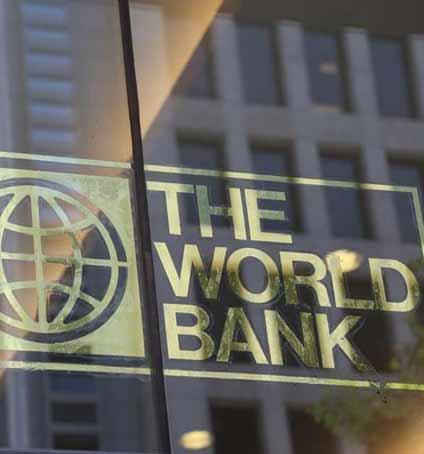
According to the report, going forward, growth is expected to ease to 4.4% in 2023, reflecting a projected slowdown among trading partners, prior to stabilizing at around 5 percent in the medium term.
“Thanks to lower international commodity prices and the appreciation of the Lari, inflation has declined significantly. In May, annual headline inflation reached 1.5% (in annual terms).
“Despite continued pressures likely on the demand side, inflation is expected to remain below the National Bank of Georgia (NBG)’s 3 percent target as monetary policy remains tight.
“While uncertainty is high, risks to this outlook are broadly balanced. On the downside, a reversal of money transfer inflows coupled with the tightening of global financial conditions could impact on the lari, potentially affecting macrofinancial stability due to the high levels of dollarization.
“On the upside, money inflows may last longer than initially expected, and Georgia could continue to benefit from some trade diversion as transport corridors are reconfigured,” it added.
GEORGIA TODAY JUNE 23 - 29, 2023 7 BUSINESS
Campaign "Women for Women" of Per Te Continues

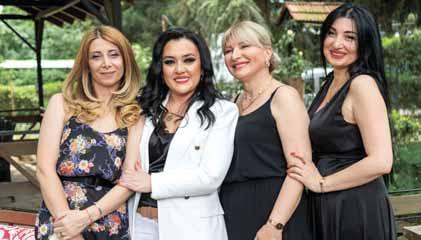 BY MARIAM MTIVLISHVILI
BY MARIAM MTIVLISHVILI
The campaign ‘Women for Women’ of Per Te continues, this time hosting a new team of girls to be trained in the profession through a completely free training course. The introductory event was hosted by "Theorema" restaurant and saw the new students given the opportunity to hear about the experiences of the previous group from the same course.
"The first project received so much positive feedback, so much love, and the girls were so empowered, that I became motivated to continue this charity work. My biggest pride is my project ‘Women for women,’ which helps the socially vulnerable, victims of violence, and girls from ethnic minorities,” says Natia Abulashvili, Director of Per Te.

"The reality exceeded my expectations. When I arrived at Per Te, I was met by a special environment and an extraordinary person, Natia. I thought I knew everything because of my age, but I learned a lot from her both professionally and personally. My time at Per Te was the best!” says one graduate student. The course consists of a theoretical and a practical part. At the beginning,
the project participants are given a special preparatory training, through which they learn how to do the work in a way that is different from how others usually do it. This increases the level of motivation. There is a maximum of 4-5 girls in the preparatory groups of Per Te training courses, so that they get top quality out of studying for their future profession.
"I’ve wanted to join this project for a long time and I’m very happy that I’ll have the opportunity to participate now. I think that everything will change for the better and I will achieve success from a professional point of view, with Natia’s help," says one new course participant.
"I heard about this project a long time ago and I wanted to participate. I contacted the PR manager of Per Te, Masho Javakhishvili, and, after a long wait, I am happy to say I got in and will be on the next Per Te training course. I really hope to succeed," says another new course participant.
The Per Te project has already given many girls the opportunity to learn and acquire a profession. The Women for Women campaign will continue to help women in need, and after the completion of this course, based on the high level of community desire, it will host another group of motivated girls in the fall.
GEORGIA TODAY JUNE 23 - 29, 2023 8 BUSINESS
“Beka’s School” - Start Learning English Today
BY MARIAM MTIVLISHVILI
Beka’s School is an English language center that creates different courses for both its students and companies. It offers its students a teaching method based on theory and practice, which includes studying the theoretical part, as well as speaking English with “native-speaking” teachers. Beka's School will soon print its own English grammar book. To find out more, GEORGIA TODAY talked to the co-founders of Beka’s School - Natali Kenkadze and Beka Berikashvili.
WHEN AND WHY DID YOU DECIDE TO CREATE BEKA’S SCHOOL?
Beka: We created the school seven years ago. Before that, I taught with an American teacher for about one year. We would teach students at my home. Studying together with a Georgian and an American teacher proved popular with students, but I wanted to give it a more organized form, so I started this business with my old friend, Natali, who already had previous experience in education and business management. At first we had a small space with two teachers and about 60 students. Since then, we have changed three locations and now have about 400-450 regular students and 35+ employees. We’re already quite a big center!
TELL US HOW YOU WENT ABOUT SELECTING TEACHERS AND CREATING COURSES.
Beka: Since the beginning, we have been aiming to have many experienced "native speaking" teachers. At the moment, we have teachers from America, Britain, South Africa, and Georgia.
Our main principle is that the Georgian teachers teach grammar and vocabulary to students, and we offer conversational English only with "native speakers." The combination works very well. Because students understand the grammar explained in their native lan-
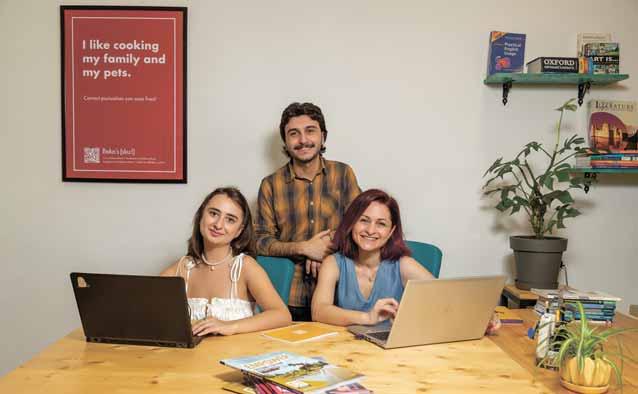
guage very well. In the practical part they only have contact with "native speakers" because they have no other choice - they have to speak English, and this helps the students to activate passive knowledge. When there is no other way, you speak English!
In parallel, we developed an Express English course in which only "native speakers" teach. The course is highly intensive - there are daily lessons, and the main goal is to help students to quickly overcome issues regarding confidence and other barriers that prevent them from speaking English.
It is often the case that you have some level of English, but you can’t speak according to that level. Here, the Express English Speaking course helps you to speak according to your level of knowledge, and transfer passive vocabulary to active.
In addition, we have a business English course and courses for teenagers, and in all areas we try to adapt to the students who are on the course. For example, courses for teenagers are loaded with fun activities and quizzes so that learning English is never boring.
In general, we are quite particular in the process of selecting teachers. We do not hire just anyone as a teacher - candidates go through a rather difficult process before they start working with us.
It is very important for us that the teacher not only has a diploma in philology, or many years of experience, but that they have "passion" towards teaching. They should be motivated and able to give good education to people in a way that is interesting. They should be able to do all this in a fun way.
In short, both are important for us - to get a quality education in a very fun environment, and this requires the right teachers, and therefore it has never been easy to select them. Now, we have a very large team of teachers and we highly value them.
WHAT MAKES BEKA’S SCHOOL DIFFERENT FROM OTHER ENGLISH LANGUAGE CENTERS?
Natali: First of all, what sets us apart from other schools, in my opinion, is our
fun and positive environment, and our approach to students. Our teachers constantly try not to have a very academic and stressful learning process, but rather to make it more individual-oriented, comfortable and friendly.
We have a large team of teachers, probably with the biggest number of "native speaking" teachers in Georgia.
In addition, we offer not only our students, but anyone interested, to attend our free weekly workshops and clubs aiming at practicing English in an informal environment.
We cooperate with the non-governmental organization "International Center for Peace and Integration", whose foreign volunteers organize various clubs at Beka’s School. These are - English language club, board games, improvisational theater, “Mafia Nights”, etc.
We also cooperate with Amirani Cinema and host a free movie club every other Tuesday, followed by an open discussion with wine. The movie club is organized by Canadian filmmaker - Toby Andris.
In addition to the free clubs, we also have a scholarship program that can be used by anyone who needs to improve their English but does not currently have the financial means to do so. Recently, we started a TV column on the morning show of “Formula”, where Beka gives various tips and advice to people trying to improve their English. Our free video lessons have also contributed a lot to the promotion of Beka's School during past years.
DOES BEKA’S SCHOOL OFFER ANY SERVICES FOR COMPANIES?
Natali: Yes. Beka's School also has a corporate service, within the framework of which we have been cooperating with various local and international nongovernmental organizations and businesses for the last several years. Within this service, we offer them different types of ready courses and we can also offer them to create new courses according to their needs. At the end of each month,
we provide them with an individual progress report about their employees and their attendance records. We ask for feedback from our partners and from each student and improve the teaching process accordingly.
TELL US ABOUT YOUR FUTURE PLANS.
Natali: Until now, we have only taught adults and for a very long time, there has been a demand from customers to start teaching children. Therefore, we are starting new courses for teenagers aged 11-16-year-old from September 11. The course will last 10 months, and during this period of time, one level will be covered. There are two lessons per week, for an hour and a half. Beginner and Elementary level groups are taught by a Georgian teacher, and higher-level groups are taught by a "native speaking" teacher.
We are also planning to release an English Grammar Book for the fall, which has been in the works for the last 5 years.
UN Calls for Coordinated Global Action on Disinformation, Hate and Artificial Intelligence
The world must address the “grave global harm” caused by the proliferation of hate and lies in the digital space, United Nations SecretaryGeneral António Guterres said at the launch of his report into information integrity on digital platforms.

Alarm over the potential threat posed by the rapid development of generative artificial intelligence must not obscure the damage already being done by digital technologies that enable the spread of online hate speech, mis- and disinformation, stressed the UN chief.
Digital platforms have brought many benefits, supporting communities in times of crisis and struggle, elevating marginalized voices and helping to mobilize global movements for racial justice and gender equality. They help the UN to engage people around the world in pursuit of peace, dignity and human rights on a healthy planet.
Yet these same digital platforms are being misused to subvert science and spread disinformation and hate to billions of people, fueling conflict, threatening democracy and human rights, and undermining public health and climate action.
This clear and present global threat demands coordinated international action to make the digital space safer and more inclusive while vigorously protecting human rights.
Existing responses have, to a large extent, been lacking. Some tech compa-

nies have done far too little, too late to prevent their platforms from contributing to the spread of violence and hatred, while Governments have sometimes resorted to drastic measures – including blanket internet shutdowns and bans –that lack any legal basis and infringe on human rights.
The policy brief puts forward the framework for a concerted global response though a Code of Conduct for information integrity on digital platforms, outlining potential guardrails to contain this runaway threat while safeguarding freedom of expression and information. It includes the following proposals to
be built on in a Code of Conduct: Governments, tech companies and other stakeholders should refrain from using, supporting, or amplifying disinformation and hate speech for any purpose.
Governments should guarantee a free, viable, independent, and plural media landscape, with strong protections for
journalists.
Digital platforms should ensure safety and privacy by design in all products, alongside consistent application of policies and resources across countries and languages.
All stakeholders should take urgent and immediate measures to ensure that all AI applications are safe, secure, responsible and ethical, and comply with human rights obligations.
Tech companies should move away from business models that prioritize engagement above human rights, privacy, and safety.
Advertisers and digital platforms should ensure that ads are not placed next to online mis- or disinformation or hate speech, and that ads containing disinformation are not promoted.
Digital platforms should ensure meaningful transparency and allow researchers and academics access to data, while respecting user privacy.
The policy brief is the latest in a series based on proposals contained in Our Common Agenda, the Secretary-General’s 2021 report that outlines a vision for future global cooperation and multilateral action. Together, the briefs are intended to inform discussions ahead of the SDG Summit in September, marking the midpoint towards achieving the Sustainable Development Goals, and the related Summit of the Future next year.
The policy brief is available at https://www. un.org/en/common-agenda/policy-briefs
GEORGIA TODAY JUNE 23 - 29, 2023 9 BUSINESS
UN secretary General Antonio Guterres. AP Photo/Khalil Senosi, File
Georgians and Armenians Come Together over Wine, Food, and Mimino

was last month combined with an exquisite festival of local dishes, sleek-flavored and unique wines, and of course mouthwatering street food.
Combined with artisans from both nations presenting their handiwork, the main street in Dilijan rang with the sounds of traditional music and crackling grills. Adorning the scene were iconic quotes from the movie, the old repurposed army truck used in the film, as well as a used tire - an item only true fans of the film will recognize. A stage in the center of the festival played the film on repeat, with each country showcasing their traditional dances and music alongside.
BLOG BY MICHAEL GODWIN
Sharing an intertwined culinary, religious, and cultural history, Georgia and Armenia have long had much to celebrate. From shared inspirations in the kitchen to a legacy of fending off invading forces from the Ottoman, Russian, and Persian empires, the duo make up the heart of the South Caucasus. However, the two cultures came together not only with food, wine, and song, but with the legendary Soviet-era film ‘Mimino’.
For the uninitiated, the film Mimino is a 1977 comedy by Georgian director Georgiy Daneliya starring Vakhtang Kikabidze, who plays pilot Valiko Miz-
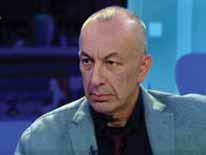
Two Verses of the Famous Georgian Poet Dato Maghradze
andari, nicknamed Mimino, and Frunzik Mkrtchyan, who plays truck driver Ruben Khachikyan. In short, the story follows the two, who, after making friends in Moscow, engage in various adventures including a criminal case, flying one of the Soviet Union’s most advanced commercial airliners, and eventually returning to Telavi.
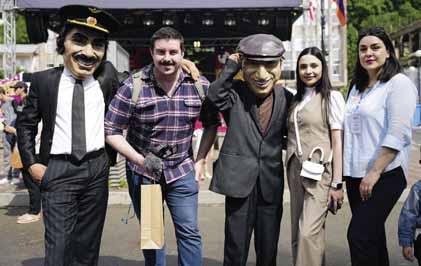
The film has garnered a form of cult following, with more and more young people enjoying the film and relating to its underlying theme of always remembering where you came from and returning to one’s roots. Additionally, it is the hilarious combination of the two, the ambitious but homesick Georgian pilot and the ever-energetic and optimistic Armenian trucker, that brings the two communities together. In the northern Armenian town of Dilijan, that essence
The Mimino Festival, a first of its kind, displays the similarities as well as the differences in both nation’s offerings. While some dishes share similar spice combinations, vegetables, or cuts of meat, others are unique only to one of the two. Wine, a hallmark of both nation’s table sets, flowed plentifully, allowing visitors to imbibe the best of both countries' harvests.
What the event aims for, aside from driving down the hunger and thirst of the throngs of visitors from a myriad of nations, is increased cultural cooperation between the two countries. In Armenia, which still hosts a small number of Georgian restaurants, there are often the ubiquitous staples of Khinkali or aubergine with walnuts. Georgia likewise shares not only its own version but also the Armenian variation on dolma (or tolma) as well as a selection of Armenian restaurants in the capital of Tbilisi. With each nation receiving an ever increasing number of tourists per year, the opportunity for the two to offer travelers the experiences of the other is ripe. A culinary, cultural, and economic
cross pollination opens the door for tourism in both nations to further develop. While the Mimino Festival is only a microcosm of this collaboration, it shows a sliver of the full potential the South Caucasus duo have in store for those that hunger for more unique experiences in the history-soaked mountains. Additionally, the town of DIlijan is not chosen lightly as the setting for such an event. The region has been earmarked as a center of intensive development. While the town may seem small upon arrival, it boasts some impressive eateries, awe-inspiring views, and exceptionally comfortable lodging options for any type of traveler. All of this is maintained while still offering a small-town Caucasian experience.
Armenia, like Georgia, has redoubled its efforts in both the private and public sectors in tourism. Be it the wandering backpacker wanting the personal touch of the family guesthouse or the discerning traveler wishing for something more haute couture, Armenia has something for all. Coming from Georgia, Dilijan serves as the perfect first taste of this experience.
At the closing of the festival, dancing troupes from both Armenia and Georgia took to the stage to perform their respective nation’s dances. While only consisting of youth groups, they performed intricately choreographed numbers to historical music that draws from the diverse regions of each country. As the evening turned to night, the crowds were slow to disperse, still savoring the flavors, laughs, and sense of community an event like this can only offer.
Following the event, it's evident that the impact is real. Each nation, and indeed each region within the country that was represented, left its mark on the visitors leaving them salivating for more. Like the classic film Mimino, the combination of Armenian and Georgian cultures offers a unique experience from which not only locals but tourists from around the world reap the benefits.
This article and accompanying photographs were graciously made possible with the immense resources and support of the Tourism Committee, Ministry of Economy, of the Republic of Armenia, and the wonderful team at Caucasus Holidays (https://caucasusholidays.am/).
Parliament Adopts Law Regulating Paragliding Flights
 BY ANA DUMBADZE
BY ANA DUMBADZE
The parliament adopted a law regulating paragliding flights.
Dato Maghradze. Source: xnews
TRANSLATED FROM GEORGIAN INTO ENGLISH
BY KETEVAN TUKHARELI
The State
The new law defines the issues determining the suitability of paragliding equipment, as well as the certification of the paraglider operator and the issuance of the paraglider pilot’s license.
In particular, paragliding is allowed
only in the airspace designated by law. Paragliding regulation, certification of the flight location and operator, issuance, suspension, cancellation of a paraglider pilot’s license/category, and determination of paraglider suitability is to be carried out by a legal entity determined by the Government of Georgia, which meets the following criteria:
Has at least 10 years of experience in the field of paragliding, including cooperation with international organizations working in the same field;
At least 50 people are members of the
public body; Has the appropriate technical equipment and appropriate software for paragliding suitability checks, with the help of which it produces relevant registers in accordance with the rules established by the law.
“We are sure that by adopting this legal framework, we will jointly be able to reduce to a minimum the accompanying risks, which, unfortunately, accompany paragliding flights, and thus we will be able to save the lives and health of many people,” said Deputy Minister of Economy
Mariam Kvrivishvili.
Talks about regulating this area in Georgia began in the summer of 2022, after a crash in Gudauri, as a result of which a rescue helicopter also crashed and 8 crew members died.
The helicopter was on its way to rescue a paraglider and his companion who had hit a rock.
After this, paragliding of any kind was banned in Georgia and work on the regulations began.
Paragliders have been demanding the resumption of flights for months.
GEORGIA TODAY JUNE 23 - 29, 2023 10 SOCIETY
In the citizen, The priest looks forThe parish, The leader – a supporter, The clark – a payer, The advocate – a witness, The rich – a simpleton, The poor – a patron, The poet – a friend.
it is
I’ve said,
the
copy,
what I wanted to say, Is the original, That is, the first source.
The Original I think the time of this Verse has past, It has become old, But I think
still Looking forward to Expressing the untold. In other words, Whatever
Is
original’s
And
Anna Margaryan, Public Relations Manager from the Armenian Tourism Committee (second from right), and Alla Ghazaryan, Project Coordinator from Strategic Development Agency (far right) pose at the festival with Mimino characters. Photo by the Tourism Committee of the Republic of Armenia
Festival goers and booths line the streets in Dilijan. (Photo by Mike Godwin)
Rust, Again…


dry off the steel, because I need it not to be wet for my photos. But once I got there, the sun began to peek out a bit, nearly overhead, making me have to shift my position to avoid shadows on my flat, horizontal subjects.
BLOG BY TONY HANMER


Inever get enough of the stuff. And being that I was about to return to Svaneti for the summer, I decided to make another visit to my favorite place for seeing rust in Tbilisi: a massive open-air steelyard at the Didube end of the huge Eliava Bazaar. While good rust can be had at any jarti
(scrap metal) yard, and in many other places elsewhere too, relatively new sheet steel has a certain mix of its own bluish tomes and the super-abstract traceries of freshly formed rust jumping out at you in reds and yellows. The warm hues really do seem to float above the cooler ones when they are next to one another, due to the way our eyes and brains perceive color. The weather was warm and cloudy, an ideal day after light rain long enough ago to both develop rust further and then
I first looked at the topmost sheets of new steel wherever I could find them: it had been a few months ago that I was last here with my film crew, so I could reasonable expect some sales to have revealed at least one new layer on each pile. In this I was not disappointed. The color ranges and literally unimaginable forms lay spread out around me, and I started shooting, simply using my camera’s 18-55 mm kit lens. It’s really just a matter of composing a scene in the rectangle of the viewfinder, eschewing formal centered-subject balance for something more interestingly off-center. Although all of what I’m seeing is abstract, it either suggests something concrete or represents a purely alien scene, which suits me fine.
Once I exhausted the flat sheet steel, I then began hopping and climbing onto adjacent I-beams and square pipes of large enough width to be able to shoot with the same lens. The steel used in these forms gives much more warm colors and less bluish ones, but there are still endless fantastic shapes and compositions to discover in this palette. I was sweating a little, but nothing was going to distract me from the shapes, landscapes and compositions dazzling me. I ended up with over a hundred new images, then headed off home to begin “post”, the processing of the RAW digital files.

My workflow with rust is simple. Correct edges and square grid lines. Improve color, trying to make it as close to that of the originals as possible but tweaking both contrast and saturation where necessary. Save both a full-size lossless version in 16 bits per color channel of RGB and a smaller, 8-bit JPEG version to go in my master folder of JPEGS for quick searching. I began immediately, and was stunned all over again by the forms emerging on my laptop screen. This time, too, I began naming some of the images based on what I saw in them, as I posted a new album of them to my Facebook
page, www.facebook.com/anthony.tony.
hanmer
Then it was time to pack up and leave for my Svaneti home and my dear wife, waiting for me. Stay tuned for news of a group exhibition on rust in which I hope to participate in Tbilisi this autumn.
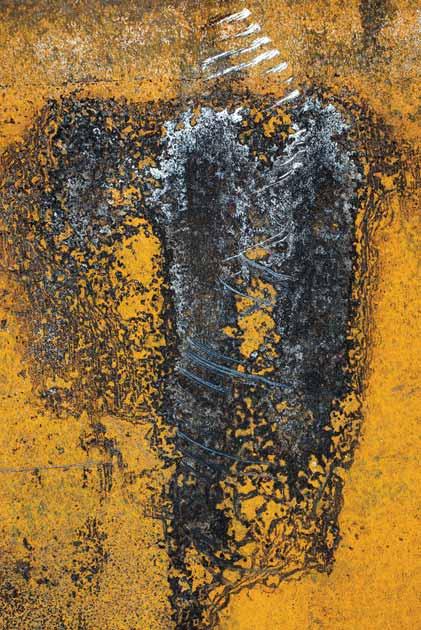
Tony Hanmer has lived in Georgia since
1999, in Svaneti since 2007, and been a weekly writer and photographer for GT since early 2011. He runs the “Svaneti Renaissance” Facebook group, now with nearly 2000 members, at www.facebook.com/ groups/SvanetiRenaissance/ He and his wife also run their own guest house in Etseri: www.facebook.com/hanmer.house.svaneti
PUBLISHER & GM George Sharashidze
COMMERCIAL DEPARTMENT
Commercial Director: Iva Merabishvili
Marketing Manager: Natalia Chikvaidze
EDITORIAL DEPARTMENT:
Editor-In-Chief: Katie Ruth Davies
Journalists: Ana Dumbadze, Vazha Tavberidze, Tony Hanmer, Emil Avdaliani, Nugzar B. Ruhadze, Michael Godwin, Ketevan Skhirtladze, Mariam Mtivlishvili, Erekle Poladishvili
Photographer: Aleksei Serov
Website Editor: Katie Ruth Davies
Layout: Misha Mchedlishvili
Webmaster: Sergey Gevenov
Circulation Managers: David Kerdikashvili, David Djandjgava
ADDRESS 1 Melikishvili Str. Tbilisi, 0179, Georgia
Tel.: +995 32 229 59 19
E: info@georgiatoday.ge
F: GeorgiaToday
ADVERTISING & SUBSCRIPTION
+995 555 00 14 46
E-mail: marketing@georgiatoday.ge
Reproducing material, photos and advertisements without prior editorial permission is strictly forbidden. The author is responsible for all material. Rights of authors are preserved. The newspaper is registered in Mtatsminda district court.
Reg. # 06/4-309
GEORGIA TODAY JUNE 23 - 29, 2023 11
GEORGIA TODAY
CULTURE












 BY MARIAM GORKHELASHVILI
BY MARIAM GORKHELASHVILI









 BY MARIAM MTIVLISHVILI
BY MARIAM MTIVLISHVILI







 BY ANA DUMBADZE
BY ANA DUMBADZE






